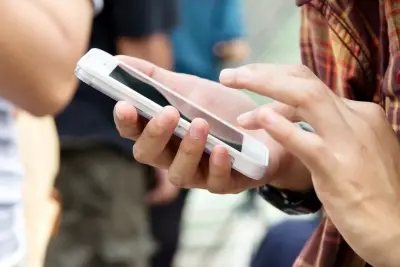Smartphones have become embedded in our daily lives; from surfing the internet and checking the news to connecting with friends and posting on social media. In a recent survey, the majority of parents believed that 11 years old was the ‘acceptable’ age for children to have their own phones. However, one parent that breaks that mould is senior cabinet minister, Matthew Hancock.
Yesterday, the former education minister whose current brief includes digital policy, told the Telegraph that more schools should refuse to let students use their mobile phones whilst at school: “Whilst it is up to individual schools to decide rather than government, I admire headteachers who take a firm approach and do not allow mobiles to be used during the school day. I encourage more schools to look at the evidence and follow their lead.”
While Hancock himself allows his children to use the internet to do their homework, he doesn’t let them on social media. He said: “They don’t have access to the devices. They don’t have phones. Why do they need phones? They’re children, they’re 11.”
There are ongoing debates around the benefits and challenges of the internet – including social media – when it comes to children. As well as issues surrounding radicalisation, cyberbullying and mental wellbeing, Hancock believes that many aspects of growing up are becoming ever more complicated due to their online habits.
Currently schools have the freedom as to whether they completely ban or restrict the usage of mobile phones during the school day, with the Department for Education (DfE) claiming that 95 per cent of schools in England already have policies in place, which is something that they must make clear to pupils, parents and staff.
However, while the DfE states that a substantial number have prohibited the use of mobiles completely from school premises altogether, is a blanket ban really the solution?
Technology is naturally becoming more integrated in teaching and learning, and this includes the use of mobile phones. And while many schools invest in hardware like tablets, they’re not all able to provide 1:1 provision. However, the majority of young people have access to some form of tablet or smart device at home, allowing for a more flexible approach such as a bring your own device (BYOD) model.
In addition to this, children are digitally savvy. So, for the majority of students, being able to use smartphones and interactive technology will fit with their lifestyles, often meaning they’re more likely to stay on track and be motivated to complete the work.
Of course, there are concerns around security as well as students becoming distracted. However, with the right training and appropriate monitors in place – both on the school’s network and within the classroom itself – then surely, we can help students learn in a way that keeps them engaged, without exposing them to the dangers that social media and the internet can potentially present?
We don’t ban the use of mobile phones in a working environment, so why should we at a school level? By considering a more balanced approach to the usage of devices during the school day, students will be better prepared for the world of work.
Hancock referenced that: “Studies have shown mobile phones can have a real impact on working memory and fluid intelligence, even if the phone is on a table or in a bag.” While this is certainly a fair point, there are also plenty of educational apps and resources designed specifically for tablet and smartphone use that provide gamification, interactive and engaging ways to help students learn more effectively.
Both parents and teachers have a responsibility to educate children on using technology and the internet appropriately. What works for one school may not necessarily work for another, so we shouldn’t encourage either route. It should be left to schools and teachers to decide how best to implement policies around mobile phones in order to allow their students the best possible educational experience.





